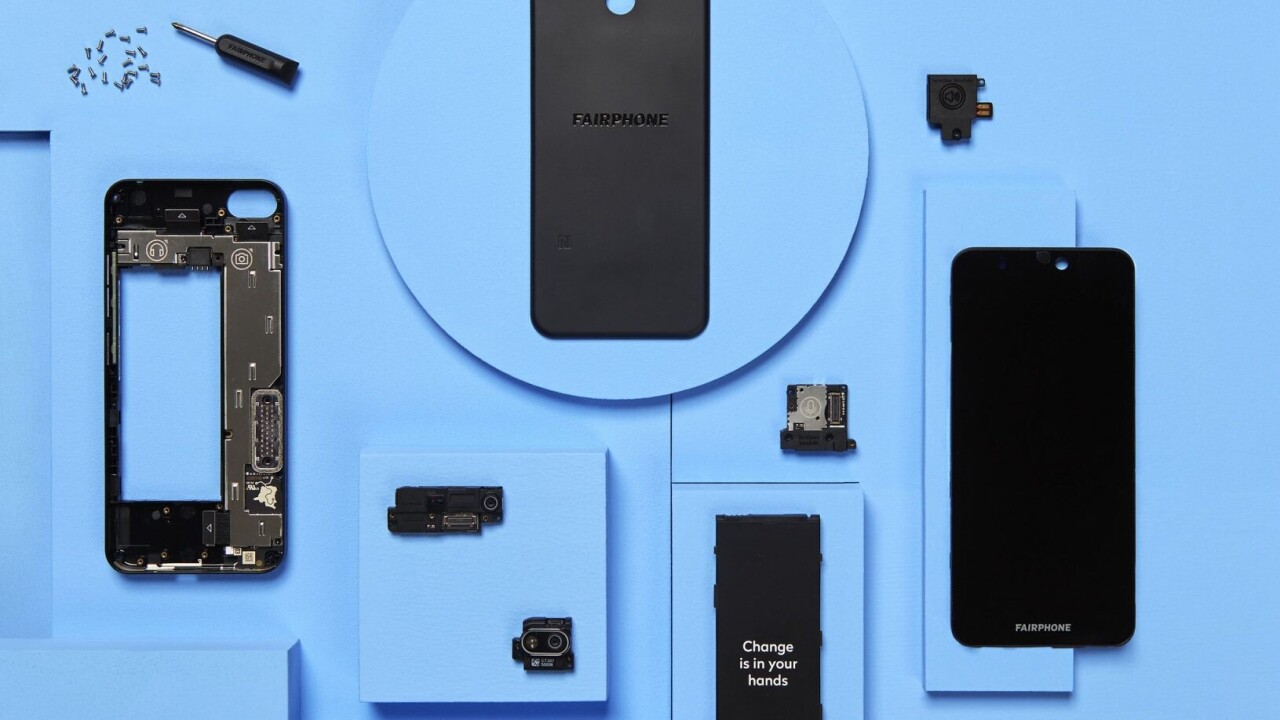Most phone companies release several models throughout the year to give users more choice — and sell loads more devices than if they just offered a single one.
Fairphone, a company with a core mission to make sustainable devices, is trying to chart a different path than most phone makers by breaking that cycle.
It’s not a household name when it comes to buying phones. But at its core, the company wants your phone to last longer, and design it in a way that you can easily repair it yourself.
We talked to CEO Eva Gouwens about the challenges of building a sustainable phone, bucking the yearly release trend, and what the ethical electronics industry looks like.
Why it’s important to use your phone for longer
It takes a lot of resources to produce devices; Gouwens says almost 75% of CO2 emissions attributed to devices are generated during the production process. So the longer you stick with a device, the lesser the impact on the environment.
In April, the company released a lifecycle analysis for its Fairphone 4 handset — which was released in 2021 — that illustrates the carbon footprint of making and using the device.

The study indicated that you could reduce the impact on the environment by 31% if you use your device for five years instead of three.
Gouwens also mentioned that all Fairphones are modular, so you don’t have to ditch them when they develop minor issues:
Fairphones are always modular, and that means you can easily repair them because many devices are abandoned due to simple repairs. A lot of phones are not designed to allow those repairs nowadays.
Plus, we have upgrade and recycle programs to make sure the materials are used sustainably.
The company’s website says that 40% of devices returned to the company get a new life through repairs or a refurbishing process, and 60% of them are safely recycled to recover valuable resources. Gouwens noted that this program is extended to modules as well.
Bucking the trend of the yearly life cycle
Fairphone has launched five phones in total since it launched its first device in 2013. The company wants to move away from the trend of releasing a phone every year, and ask its customers to use devices longer.
For that, the company needed to make the phone “more repairable”. Gouwens said with Fairphone 4, you can replace parts like the USB-C port, which wasn’t possible in earlier iterations.

She added that over the years, it had to also learn how to strike a balance between releasing new devices and making parts for old devices available to customers.
With Fairphone 4, it’s already offering a five-year warranty, and aims to provide software support until 2027. So you can potentially buy a Fairphone today, and use it for five years and beyond.
But releasing phones with a longer gap between devices also comes with its downside. You can’t get the industry’s latest and greatest specifications in Fairphones. The company has tried to make up for that with upgradable camera modules for Fairphone 2 and 3, but that’s about it.
Building an audience for sustainable phones
Fairphone’s sustainability also comes at a cost. Its latest Fairphone 4 costs €579 (about $600). For comparison, the OnePlus Nord CE and the Samsung Galaxy M42 — which use the same processor — cost less than half of that at $342 and $300 respectively.
To that point, Gouwens said it’s about making a phone that lasts for long:
Rapid release cycles of phones have made us believe that the next big innovation is just around the corner, and it’s radically different from the previous one. But it’s never really life-changing, and smartphones have become more and more similar over the years.
So with Fairphone 4, we aimed to make a phone that was relevant for years of usage.
Despite favorable press coverage and praise for its repairability, Fairphone has a relatively small sales volume as compared to well-known industry players.

The firm sold 100,000 phones last year, and has already sold 50,000 devices this year. For comparison, Apple reportedly sold more than 239 million devices last year.
The company said it has more than 200,000 active Fairphone users. But it expects that number to go up rapidly soon.
What does the future look like?
Fairphone’s scale compared to other smartphone makers in the market is minuscule. The company only operates in Europe, and sells a few thousand phones every year.
It says that its customers have been people who are willing to compromise on specifications as long as they are contributing to the sustainability movement. Gouwens said they want to reach a wider audience now:
Our mission is that we want to establish a market for ethical electronics to motivate the industry to act more responsibly.
Now we need to convince users who are not willing to compromise and just want a normal phone. But they are willing to pay a premium as long as the company’s goal is noble.
She added that Fairphone wants to increase brand awareness in Europe — which is around 10% — before expanding to other regions.
To that end, the company launched a pair of truly wireless earbuds at €99.95 last year. So folks that don’t want to buy the phone yet, can still contribute to the sustainability initiative with another gadget.

In the last few years, Apple and Samsung have announced environmentally friendly initiatives, including ditching charger bricks from the phone and using recyclable materials in their devices.
Gouwens emphasized that Fairphone is different, because it’s looking at making a ground-up impact. Instead of focusing on recyclable components, the company believes it’s better to focus on how to increase a device’s longevity:
“We want to solve the worst problems of phone making. We have an agenda of changing the system. So we need to aim for longevity and partnerships, and not have these initiatives in a closed system,” she said.
Get the TNW newsletter
Get the most important tech news in your inbox each week.






